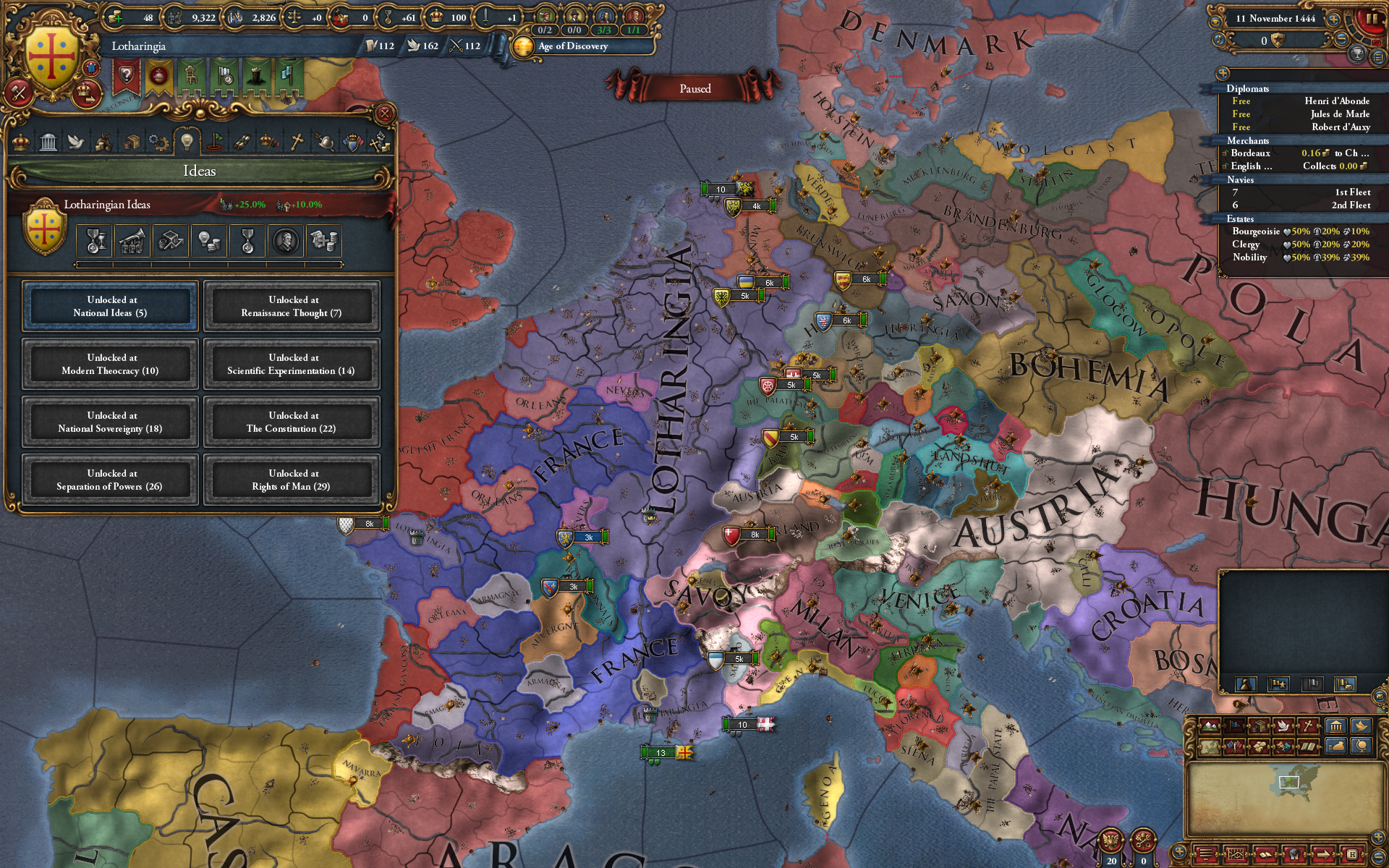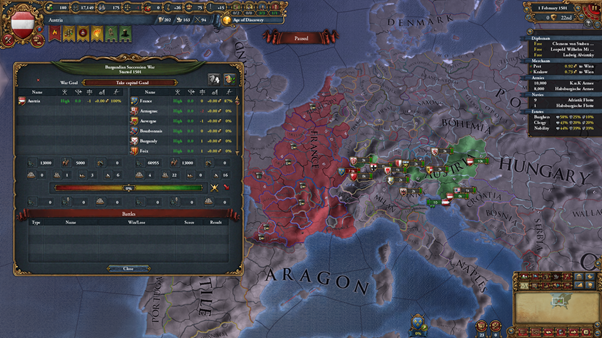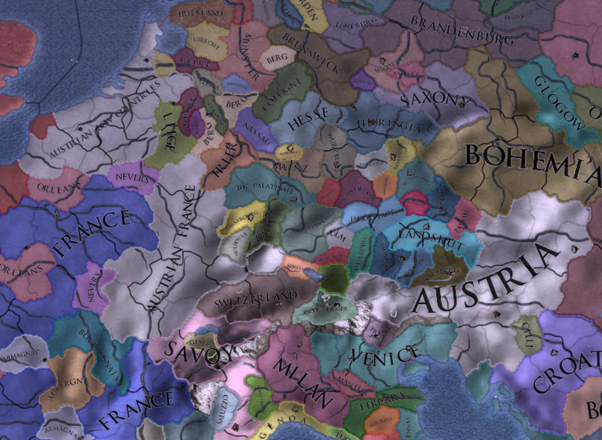Hello! Welcome to another dev diary for Europa Universalis IV: Emperor. Today we’ll be revealing new content for Burgundy, famous in this era for its immensely confusing succession crisis that forever altered the balance of power in Europe and laid the foundations for Dutch independence.
We’ll begin with the new Burgundian mission tree. Wedged between France and the Holy Roman Empire, Burgundy has a challenging but rewarding path to follow.

The leftmost branch contains some familiar missions, involving the conquests of Savoy and Provence. We’ve also included a couple of additional missions in this chain: Invade Lombardy and Kingdom of Italy push you to continue your southward expansion. Completing the final Kingdom of Italy mission rewards you with the Rex Italiae modifier, granting -5% Idea Cost and +10% Institution Spread for the rest of the game.
Burgundy begins as a divided realm, with its wealthy holdings in the Low Countries owned by Personal Union subjects. Burgundy must placate these subjects to begin the next branch of the mission tree. After Burgundy finds a way to Unite the Realm, ruling over a united nation and directly owning the Lowlands, you are tasked with securing the region for the long term. You must either continue to hold the Low Countries through the Dutch Revolt or find some way to avoid it (and there will be opportunities to do so). With the Dutch provinces finally secured, you’ll be tasked with Dominating Channel Trade, which rewards you with a permanent bonus to your Trade Efficiency and Trade Steering.
EUIV begins in the midst of the Hundred Years War, with England and France constantly at each other's throats. Burgundy has played a crucial role in this conflict in the past, and can continue to do so from the start of the game. You are tasked with establishing an English Alliance, which unlocks the mission League of the Public Weal. This requires you to achieve very good relations with at least 3 of the French vassal Duchies. As a result, all of these Duchies gain +50% Liberty Desire, depriving France of their vassals support at a critical moment. This will aid you in becoming King of the Franks; owning Paris and 17 other provinces in the France region, as well as being physically and militarily greater than France, will give you permanent claims on all of France, and all of their remaining vassals will immediately be transferred to you.
After improving Papal Relations, Burgundy can organize a new Crusade against the Ottomans at the Feast of Pheasants. To achieve this you must either have 2 allies who have set the Ottomans as a rival, or else 1 ally that has the Ottomans as a rival that is also a great power. When you complete the mission, all Catholic countries with a positive opinion of Burgundy and a negative opinion of the Ottomans will gain a Holy War CB against the Ottomans for 5 years.

You’ve likely noticed that the flag used in the mission tree screenshot above is not the Burgundian flag we know and love. That’d be because Burgundy gets an expanded mission tree upon forming Lotharingia - the medieval realm of Lothair, descendant of Charlemagne. With the Emperor expansion this is handled through completing the Crown of Lothair mission, but without Emperor there will be a decision. Besides expanding your mission tree, you’ll have the option to switch your national ideas to Lotharingian ideas.
I’ll now hand you over to @Meka66, who implemented the redesigned Burgundian Inheritance content.
The Burgundian Inheritance event chain has been completely reworked for Emperor, with the entirety of the old system gutted out and replaced with something much more dynamic and directly involving for the Emperor and France.
The previous incarnation of the Burgundian Inheritance was something that only AI Burgundy would have to contend with, and without diving into the game’s arcane scripted event files, players would be unable to be directly involved in the inheritance and would be limited in how they interact with it.

In the new system however, the Burgundy player takes direct control of Charles’ historical successor; Marie de Bourgogne, and is able to make a direct choice as to which nation they are “inherited” by via a royal marriage with each of these choices triggering a unique Imperial Incident for the Emperor!

Should Marie choose to marry into the HRE, the Emperor will be presented with a choice as to how he distributes his newfound lands and territories.

The first option is to cede lands and territories to France while keeping the rest of Burgundy under personal union. This will of course make France happy, but will be of little benefit to the Emperor outside of that.

The second option is to just keep Burgundy in its entirety which will grant France cores all over Burgundy’s territories in the French region and give France a righteous cause to declare war.

The third option (and my personal favorite) is to integrate Burgundy into the Empire. What this means in practice is that you will “balkanize” all of Burgundy’s territory into smaller independent imperial Princes, leaving Burgundy with only its namesake while Luxembourg and the like are freed from their control.
Should Marie choose to marry outside of the HRE, however, this triggers an entirely different incident altogether. Burgundy can marry back into the French Kingdom or seek the support of a strong marriage partner, and choosing to do so will put the future of their kingdom entirely in the hands of their new overlord.

The Emperor may demand the Low Countries from Burgundy’s new overlord, and should they accept; Flanders, Holland, etc. will be released back into the Empire as free Princes. Should Burgundy’s overlord refuse, the Emperor may go to war to press his imperial claims.

The Emperor can also declare Marie’s marriage entirely illegitimate and attempt to force a union on the entirety of Burgundy.
A particularly cowardly Emperor may choose to just let this issue slide and allow the succession to take place without his interference.

Whomever Burgundy marries, they shall exist under personal union until an event declares Marie’s death and Burgundy in its entirety is integrated in a manner similar to the old system; with all of Burgundy’s territories becoming a core part of one’s own nation.
For those who enjoyed gaming the old triggers in script for the old system, such a thing will still be possible with AI Burgundy; with their various options for marriage partners being decided by a number of factors by the AI. Optimize these factors, and Burgundy will very likely choose your nation to be their protector.

However, Marie de Bourgogne is not forced to marry into any particular house in Europe at all, and may in fact choose to stand on her own against the French Kingdom and the HRE. Doing so will likely lead to war with both, so surviving this version of the crisis will be quite a challenge for the Burgundian player, but may yield some interesting rewards.
That's all for today! Next week we'll take a look at some of the mission trees we haven't yet had the opportunity to reveal. Until then, have a great week.
We’ll begin with the new Burgundian mission tree. Wedged between France and the Holy Roman Empire, Burgundy has a challenging but rewarding path to follow.

The leftmost branch contains some familiar missions, involving the conquests of Savoy and Provence. We’ve also included a couple of additional missions in this chain: Invade Lombardy and Kingdom of Italy push you to continue your southward expansion. Completing the final Kingdom of Italy mission rewards you with the Rex Italiae modifier, granting -5% Idea Cost and +10% Institution Spread for the rest of the game.
Burgundy begins as a divided realm, with its wealthy holdings in the Low Countries owned by Personal Union subjects. Burgundy must placate these subjects to begin the next branch of the mission tree. After Burgundy finds a way to Unite the Realm, ruling over a united nation and directly owning the Lowlands, you are tasked with securing the region for the long term. You must either continue to hold the Low Countries through the Dutch Revolt or find some way to avoid it (and there will be opportunities to do so). With the Dutch provinces finally secured, you’ll be tasked with Dominating Channel Trade, which rewards you with a permanent bonus to your Trade Efficiency and Trade Steering.
EUIV begins in the midst of the Hundred Years War, with England and France constantly at each other's throats. Burgundy has played a crucial role in this conflict in the past, and can continue to do so from the start of the game. You are tasked with establishing an English Alliance, which unlocks the mission League of the Public Weal. This requires you to achieve very good relations with at least 3 of the French vassal Duchies. As a result, all of these Duchies gain +50% Liberty Desire, depriving France of their vassals support at a critical moment. This will aid you in becoming King of the Franks; owning Paris and 17 other provinces in the France region, as well as being physically and militarily greater than France, will give you permanent claims on all of France, and all of their remaining vassals will immediately be transferred to you.
After improving Papal Relations, Burgundy can organize a new Crusade against the Ottomans at the Feast of Pheasants. To achieve this you must either have 2 allies who have set the Ottomans as a rival, or else 1 ally that has the Ottomans as a rival that is also a great power. When you complete the mission, all Catholic countries with a positive opinion of Burgundy and a negative opinion of the Ottomans will gain a Holy War CB against the Ottomans for 5 years.

You’ve likely noticed that the flag used in the mission tree screenshot above is not the Burgundian flag we know and love. That’d be because Burgundy gets an expanded mission tree upon forming Lotharingia - the medieval realm of Lothair, descendant of Charlemagne. With the Emperor expansion this is handled through completing the Crown of Lothair mission, but without Emperor there will be a decision. Besides expanding your mission tree, you’ll have the option to switch your national ideas to Lotharingian ideas.
I’ll now hand you over to @Meka66, who implemented the redesigned Burgundian Inheritance content.
The Burgundian Inheritance event chain has been completely reworked for Emperor, with the entirety of the old system gutted out and replaced with something much more dynamic and directly involving for the Emperor and France.
The previous incarnation of the Burgundian Inheritance was something that only AI Burgundy would have to contend with, and without diving into the game’s arcane scripted event files, players would be unable to be directly involved in the inheritance and would be limited in how they interact with it.

In the new system however, the Burgundy player takes direct control of Charles’ historical successor; Marie de Bourgogne, and is able to make a direct choice as to which nation they are “inherited” by via a royal marriage with each of these choices triggering a unique Imperial Incident for the Emperor!

Should Marie choose to marry into the HRE, the Emperor will be presented with a choice as to how he distributes his newfound lands and territories.

The first option is to cede lands and territories to France while keeping the rest of Burgundy under personal union. This will of course make France happy, but will be of little benefit to the Emperor outside of that.

The second option is to just keep Burgundy in its entirety which will grant France cores all over Burgundy’s territories in the French region and give France a righteous cause to declare war.

The third option (and my personal favorite) is to integrate Burgundy into the Empire. What this means in practice is that you will “balkanize” all of Burgundy’s territory into smaller independent imperial Princes, leaving Burgundy with only its namesake while Luxembourg and the like are freed from their control.
Should Marie choose to marry outside of the HRE, however, this triggers an entirely different incident altogether. Burgundy can marry back into the French Kingdom or seek the support of a strong marriage partner, and choosing to do so will put the future of their kingdom entirely in the hands of their new overlord.

The Emperor may demand the Low Countries from Burgundy’s new overlord, and should they accept; Flanders, Holland, etc. will be released back into the Empire as free Princes. Should Burgundy’s overlord refuse, the Emperor may go to war to press his imperial claims.

The Emperor can also declare Marie’s marriage entirely illegitimate and attempt to force a union on the entirety of Burgundy.
A particularly cowardly Emperor may choose to just let this issue slide and allow the succession to take place without his interference.

Whomever Burgundy marries, they shall exist under personal union until an event declares Marie’s death and Burgundy in its entirety is integrated in a manner similar to the old system; with all of Burgundy’s territories becoming a core part of one’s own nation.
For those who enjoyed gaming the old triggers in script for the old system, such a thing will still be possible with AI Burgundy; with their various options for marriage partners being decided by a number of factors by the AI. Optimize these factors, and Burgundy will very likely choose your nation to be their protector.

However, Marie de Bourgogne is not forced to marry into any particular house in Europe at all, and may in fact choose to stand on her own against the French Kingdom and the HRE. Doing so will likely lead to war with both, so surviving this version of the crisis will be quite a challenge for the Burgundian player, but may yield some interesting rewards.
That's all for today! Next week we'll take a look at some of the mission trees we haven't yet had the opportunity to reveal. Until then, have a great week.



